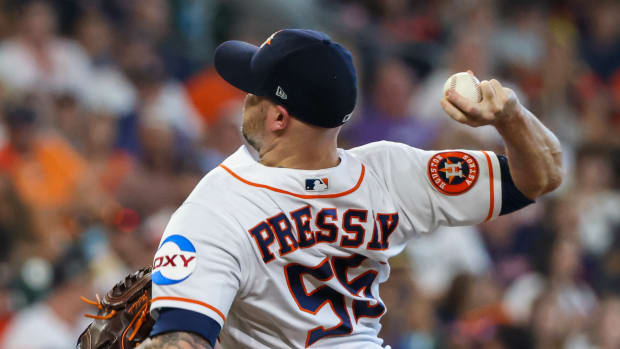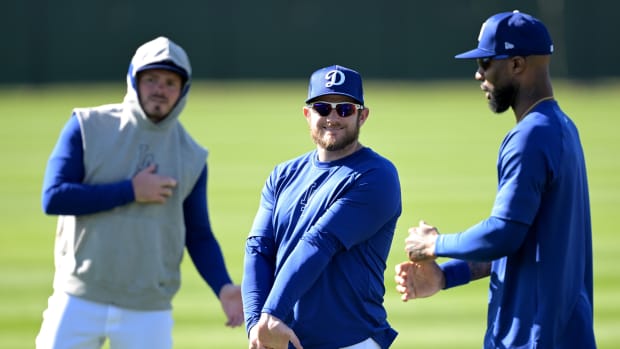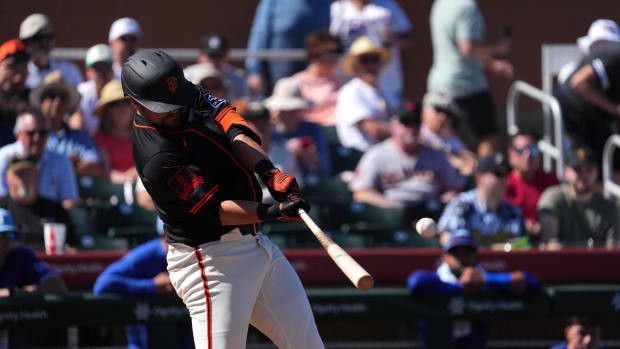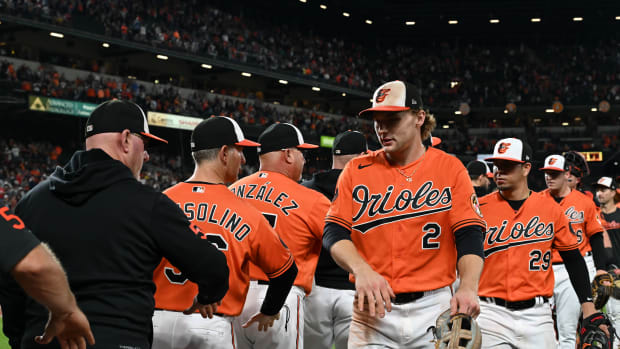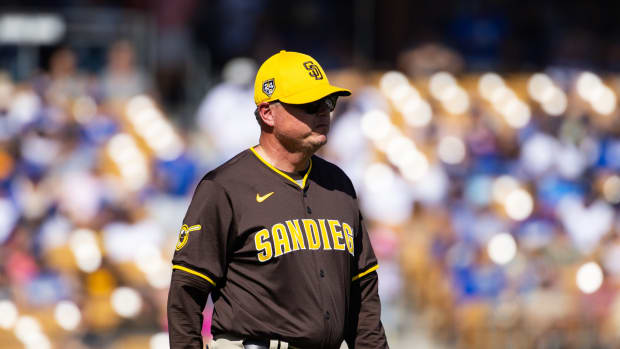Deliver Us From Failure: How the Astros Endured Futility to Become World Series Champions
It all sprang from Springer. Anyone with the Astros will tell you that. When Jeff Luhnow and his crew of rebuilders arrived in Houston before the 2012 season, wielding both sledgehammers and X-Acto knives, George Springer was already on site. Not in Houston; he was still two years from reaching the big leagues.playing centerfield for the High A Lancaster (Calif.) JetHawks after Ed Wade’s ousted regime had drafted him 11th in June ’11, Spinger was the shiny copper piping that anyone would know to salvage from even the most dilapidated structure before the wrecking ball hits.
Second baseman José Altuve and lefthander Dallas Keuchel were there too, and the new leadership was smart enough not to dispense with them either—even though back then they looked like little more than a slap hitter and a soft tosser. But Springer, who had battled through a childhood stutter to become a polished prospect at Connecticut, was a five-tool phenom. If the members of the front office allowed themselves to dream of a championship, he was the person they imagined raising the trophy.
When Sports Illustrated predicted four Junes ago that the event would occur this autumn, Springer graced the cover, not only because his swing was so photogenic—especially in the Astros’ throwback, rainbow-striped uniforms—but also because he was the most likely player to make the moment happen. And he did.
Springer, 28, scuffled badly through a victory over the Yankees in the ALCS, and that continued through Game 1 of the World Series against the Dodgers. In those eight games he had just three singles in 30 at bats, with four walks against 11 strikeouts. But manager A.J. Hinch continued to believe in Springer—the Astros once sold T-shirts in their gift shops that read simply process—and kept him at the top of the lineup. “George Springer has way more good days than bad days,” Hinch said before Game 2 in Los Angeles, “and way more good stretches than bad stretches.”
Purchase Sports Illustrated's Commemorative Astros Covers, Issues
Then a good stretch began for Springer, one that still hasn’t stopped. He was named the World Series MVP moments after the Astros’ 5–1 thrashing of the Dodgers in Game 7, and there was no other choice. He had eight extra base hits, a World Series record. He accumulated 29 total bases, another record. He hit five home runs, tying a record. He became the only player to homer in four straight games of a Series—the last four. Everything ran through him. “A crazy journey,” Springer said amid the cigar smoke and champagne fumes in the Dodger Stadium clubhouse, four hours after he had chased Yu Darvish with a two-run, second-inning blast. “A wild ride. The organization has come so far in three years.”
****
The disturbingpart, for the rest of baseball, is that the Astros’ road to success was not designed to end now. In 2014, Springer’s rookie season, they lost 92 games—a welcome development after a historically appalling run in which they had dropped 106, then 107, then 111. (“Through the lean years,” Keuchel says, “I wouldn’t have even wanted to come as a fan.”) But if their 162–324 record between ’11 and ’13 represented the nadir, then ’17 alone was never meant to represent the summit, but the first peak in a dense range.
It’s harder than ever to win back-to-back titles, in a wild-card era with an exhausting and randomizing playoff structure. The Yankees won three in a row, from 1998 through 2000, but they stand alone since Bud Selig expanded the postseason to three rounds in 1994, then four in 2012. If any team is built to repeat, though, it’s Houston.
Start with the offense, MLB’s highest-scoring, which came close to accomplishing the rare feat of finishing first in homers (the Astros trailed the Yankees by three) and last in strikeouts (which they were), in an era in which most teams must accept the tradeoff of whiffs for power. Their first four batters—Springer, third baseman Alex Bregman, Altuve and shortstop Carlos Correa—are all 28 or younger. Bregman, who already has an extra-innings World Series walk-off, and Correa, whose own storybook month ended with a televised on-field proposal to his girlfriend after Game 7, are just 23. Altuve—the likely AL MVP—won’t reach free agency until 2020, Springer until ’21, Correa until ’22 and Bregman until ’23, so far off that the World Series might then be between cyborgs.
In fact, Houston’s only free-agent hitters are outfielder Cameron Maybin, a late-season addition to the bench, and the 40-year-old Carlos Beltrán, who for $16 million this year provided more in the way of wisdom and discipline than production—though his wisdom and discipline were invaluable—and who departs, perhaps for retirement, with the ring he’s sought for so long. “It only took 20 years to get to this position,” Beltrán said on the field after Game 7, a championship cap on his head and his young son, who kept playing with his father’s ear, in his arms. “It’s a great future here. You look at the ball club, you look at every position, you see guys that can be impact players for a long time.”
With a payroll that, at just under $150 million, ranked 16th in baseball—the Dodgers’, at $265 million, was 77% higher—the Astros have the wherewithal to add a major free agent, someone with Beltrán’s savvy but a livelier bat. In the short term, Hinch can get increased use out of multitool outfielder Derek Fisher, 24; in the slightly longer term he’ll have 20-year-old Kyle Tucker, a top 10 prospect. Both bat from the left side, which is important, as the core four at the top of the order all swing from the right. That’s no coincidence. Everything is by design.
So consider the rotation covered, too. Keuchel and Charlie Morton—the previously unremarkable 33-year-old righty who began the season by signing a two-year, $14 million free-agent contract that astonished observers, and ended it by throwing four relief innings of one-run, two-hit ball in Game 7—are both on board for next year. All-Star Lance McCullers Jr., 24, the curveballing Game 7 starter, is under control until 2022. Behind them is a pair of quickly rising prospects: 20-year-old Forrest Whitley, a 6' 7" righty who struck out nearly 14 batters per nine in the minors this year; and righty Francis Martes, 21, who pitched mostly in relief for the big club this summer after being deemed the game’s 15th-best prospect by Baseball America last winter.
Sports Illustrated Selling Limited Edition Reprint of Prophetic 2014 Astros Issue
The key, in the near term, is Justin Verlander, whom Houston acquired from the Tigers with two seconds to spare before the Aug. 31 deadline. A lot was made of the contract the Astros were assuming: $28 million in each of the next two seasons for a pitcher who turns 35 in February. (The Tigers are picking up $8 million per year.) But here’s Houston’s way of looking at it: If Verlander, who went 9–1 with a 1.66 ERA for Houston in the regular season and playoffs, were a free agent this winter, they couldn’t possibly sign him, nor anyone like him, for just two seasons. Even accounting for the three talented prospects the Astros had to give up, it was a good deal.
After Game 7, Luhnow and Verlander—who was then just three days from marrying the supermodel Kate Upton in Italy—walked together off the field and into a clubhouse that had the air quality not of Tuscany in autumn but of a Beijing bar in July, not content to celebrate just one title. “Two more to go,” the GM told his still new ace.
And then: the bullpen. Something’s got to be done about the bullpen. A weakness during the season—the relievers’ ERA of 4.27 ERA ranked 17th in baseball—it was an outright liability during the playoffs, when its ERA spiked to 5.40. Still, Ken Giles almost certainly won’t continue to be the Ken Giles of October, during which he yielded 10 runs in 72⁄3 innings and coughed up his closer’s role. Collin McHugh and Brad Peacock could relinquish their spots in the rotation and excel in the pen. Joe Musgrove, awful during the playoffs (8.10 ERA) but a shutdown reliever during the second half (1.44), should continue to develop; he’s only 24. The Astros could certainly use a lefty, maybe two, to replace Francisco Liriano and Tony Sipp. The Rockies’ Jake McGee, the Royals’ Mike Minor and Tony Watson—who watched Game 7 from L.A.’s bullpen—are the cream of the free-agent crop; their representatives ought to answer calls from a Houston area code on the first ring this winter.
The Astros have something else, too, and that’s the approach they promoted when they had nothing else going for them: their Process. Call it Astroball. Yes, it relies heavily on metrics and probabilistic modeling, but it was never as soulless as its critics—and there were many—believed.
****
The front office's stroke of genius was that it realized that hard data meant a lot, and it concocted all sorts of new ways to harness it. But a reliance on data as an answer, as opposed to a tool, has led all kinds of organizations astray in recent years. What the Astros’ scouts saw and processed mattered just as much as spin rates and launch angles. That’s why Houston ended up with players like Bregman and Correa, who are never afraid, despite their youth. When the team chose Correa No. 1 in 2012—such a shock that their own public relations staff didn’t have a bio prepared for him—it was because scouting staff like Mike Elias pushed for him. Giving Beltrán $16 million dollars not just for his bat, but also for the mathematically unquantifiable ways his leadership and experience would seep into the clubhouse, was another such move.
YOUR 2018 CHAMPS: Why the Astros Will Repeat Next Season as World Series Champions
Luhnow, now assistant GM Elias, special assistants Kevin Goldstein (the scouting guru) and Sig Mejdal (the data guru)—not to mention an analytics department, self-nicknamed the Nerd Cave, which has now swelled to nine members from four just three years ago—will remain. The only way any of them is likely to leave now is if they’re offered the top job elsewhere, as Luhnow’s former top assistant David Stearns was by the Brewers. That, of course, is a greater likelihood now than it was even a week ago.
The path forward will become more treacherous in other ways. With no more 100-loss seasons, the Astros won’t pick near the top of any draft—where they grabbed Correa and Bregman (No. 2 in 2015)—anytime soon. The Cubs, who seemed poised to take multiple titles after winning last year (not unlike Houston now), remain potent. The Dodgers, with their mature talent, astute front office and seemingly limitless spending power, will be back in October soon. The Yankees, one win short of a World Series appearance in a season in which they weren’t even planning to make the playoffs, are coming. And so in a few years will be those teams that are playing Astroball, stockpiling talent as they pile up losses: the Padres, Phillies, White Sox.
But for now, the Astros are the kings, led by Springer, the young man whom they always thought could pull the sword from the stone. In the delirious clubhouse, Luhnow—that modern Merlin, wearing not a pointed hat but ski goggles—stood feet away from the Series MVP, who was surrounded by reporters.
“When Springer arrived in the big leagues, in ’14 ... well, there’s a Seinfeld episode, ‘The Summer of George,’ ” the GM said—although Springer would spend the dog days doing the precise opposite of the torpid George Costanza. “He infused such great energy into our team that from that point I knew it’d be up, not down.”
Someone passed Springer the Commissioner’s Trophy, 30 pounds of sterling silver with 30 gold-plated flags, one of which rises higher than the rest. He hoisted it over his head and shouted to his teammates, “Here it is!” They all roared back.































